The Moroccan Gendarmerie Royale at the service of citizens
The Moroccan Gendarmerie Royale is deemed to be one among the major Public Forces of the Kingdom of Morocco, possessing the tutelary, in particular, over rural areas and traffic network. Given its military status, it forms a main part of the Royal Armed Forces.
Since its establishment in 1957, it has made tremendous record in terms of human and material resources as well as the work policies adopted. Accordingly, all these prerequisites have given it the ability to perform excellently its noble mission, that is, to ensure the security, the tranquility of citizens, and the protection of their properties and the safety of the public and private assets.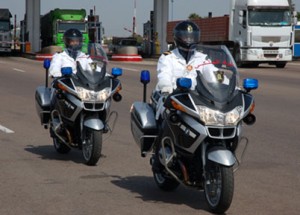
The variety of its components; namely, the territorial Gendarmerie, the mobile units, air and marine squadrons and the training given to the staff, enables it to partake actively at the defence of the National Territory, neck and neck with the Royal Armed Forces.
As far as the framework of cooperation is concerned, the Royal Gendarmerie has opened up its international environment through its participation in the Royal Armed Forces humanitarian missions and peacekeeping under tutelary of United Nations, as well as through the hosting, since 1975, of foreign officers from friendly countries to accomplish their training.
Under the highest directives of His Majesty the King, the Supreme Commander and the General Head of Staff of the Royal Armed Forces, and due to the adopted strategy of openness to international institutions, the Royal Gendarmerie has been admitted since 1998, as member of the FIEP association.
History of the Gendarmerie Royale
On 29th April 1957, the Moroccan Gendarmerie Royale was created by a law (Dahir), followed by a gradual departure of the French Gendarmerie on the first of January 1958 until its full replacement by the Moroccan one.
Moroccan Gendarmerie Royale is a force of police tasked mainly to:
• ensure public safety;
• maintain order;
• ensure law enforcement.
Multidisciplinary missions in favor of the citizen
One of the main features, which are common to almost all Gendarmeries, is the apparent paradox between the military nature of the institution and its activity which is mainly civilian. Of that, the Gendarmerie Royale operates throughout the territory, where it finds its self deeply rooted and integrated among the population.
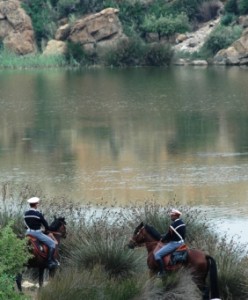
The Gendarmerie Royale, as placed under the administrative supervision of the Delegate Minister to the Prime Minister, in charge of the Administration of the National Defense, it has a constant link to other ministries such as:
• Ministry of Justice, for the exercise of the judicial police;
• Ministry of Interior, for the exercise of the administrative police.
In this context, it is tasked to the Royal Gendarmerie, to render myriad assistance to other departments.
- The Administrative Police: The mission of prevention
The core of this mission hinges merely on the application of a set of regulations dedicated to prevent any prejudice to public order. As such, the Gendarmerie Royale has a decisive role over a wide territory and the control of traffic network. It secures and facilitates the movement of people and goods.
By its inter-ministry vocation, the Gendarmerie Royale is responsible for enforcing various texts concerning all the departments for which it constitutes an extension. Its action for their benefit can be accomplished, on requisitioning or application for assistance.
The texts of various origins can be classified according to their policy areas such as security, safety, peace, public morality and the protection of the environment.
The powers of general administrative police are related mainly to the Ministry of Interior which is responsible for maintaining order.
Moreover, the jurisdiction of the Gendarmerie Royale cannot be rejected except when other officers specially authorized by law to act, are present to perform their missions. In any case, the Gendarmerie Royale should inform fairly and quickly the qualified authorities. The Gendarmes are prescribed by law to inform the authorities as a part of their general duty of protection.
Its action can be spontaneous, at the requisitioning or application for assistance of various authorities.
In the field of assistance and relief, the Gendarmerie Royale plays an important role. It takes part in relief operations on the roads, at sea and on mountains. Its action is one of the key components specified by the various plans to deal with public calamities (Map ORSEC) or in case of search for aircraft and ships in distress (SAR Plans: SATER and SAMAR)
- Protecting the environment, a daily struggle :
As in other countries, the protection of the environment is a fundamental task that requires the mobilization of all ministerial departments. For its part, the Gendarmerie Royale ranks high among the agencies involved in this field, by making this mission a pivot among its priorities.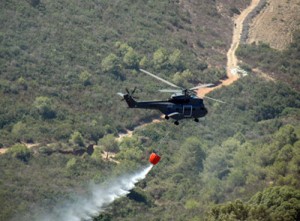
Accordingly, Police Offices of the Gendarmerie Royale, widely scattered over the country, are able to ensure actively the protection of the environment. They are able, in a proactive approach, to draw their own strategy in the defense of the natural environment, depending in doing so, a well qualified trained staff and suitable structures and tools.
- The judicial police as a means of preseving the truth:
As part of the judicial police, the territorial units of the Gendarmerie Royale are responsible for stating offenses to the penal law, by gathering pieces of evidence and pursuing criminals.
In contrast to the administrative police which is purely preventive, the judicial police is essentially linked to the repression of crime. When the judicial police begins its process, this is a sign of the failure of the prevention: a breaches to the law are already made.
It is exerted under the direction of the Bench (public prosecutor) and placed in each jurisdiction of the court of appeal under the supervision of the General Public Prosecutor and under the supervision of the criminal division at the Court of Appeal.
The Gendarmerie Royale exerts also an important role in the field of judicial police, thanks to the skill of its personnel, the material resources available to them and especially the powers conferred upon them by law. All members of personnel are, according to their rank or position, officers or agents of the judicial police
- Military police and military judicial police:
Military Police is controlled by the Delegate Minister to the Prime Minister in charge of the Administration of National Defense. It provides both prevention (general military police) and repression (military judicial police).
Its function is to prevent disorder and to maintain discipline in the various units of the Royal Armed Forces. It has also the mission of the protection of troops and ensures their relationship with the surrounding population. As such, the military police is also part of the responsibilities of the delegate arms commanders and the commanders of military units.
The Administration of Defense has the right to convict when the offenses are within the jurisdiction of the Military Tribunal. It is assisted in the investigation of crimes by military police officers, bound to observe, gather evidence and arrest perpetrators and presenting them to the competent court. The Royal Gendarmerie participates actively in the military judicial police in both its preventive and repressive aspects. It has also the duty to inform the competent military authorities of any acts or events of interest to them.
-
Defense missions
The Gendarmerie Royale participates in peacetime in defense missions, particularly through research and transmission of information to civilian and military authorities. Its scope covers:
• The preparation of mobilization: in addition to its own reserve, the Gendarmerie Royale is involved in the preparation of such armies, including distribution of documents recall (call orders and requisitions), the updating of mobilization forms at brigade level and assist the reserves department of the General Staff of the royal armed forces.
• Monitoring and protection of vulnerable areas.
In times of crisis or war, the Gendarmerie Royale is in charge special missions of defense which are added to those in peace time. These tasks include:
• The actual mobilization in favor of armies.
• Research oriented and dissemination of information;
• The Police with large units in the field;
• Participation in the organization and securing of traffic for the benefit of the units involved.
-
Appropriate organization
In view of endorsing the Commander of the Gendarmerie Royale in exerting his task, a well qualified Staff is implemented at the Headquarters, and it includes central services to manage on one hand, human, material and financial resources and, on the other hand, to ensure the preparation of orders, their transmission and their execution.
The Gendarmerie Royale is present on the national territory through its main subdivisions; the territorial and mobile units, whose action is reinforced by the Air and Maritime Gendarmerie and specialized units.
-
The major subdivisions
The two subdivisions, territorial and mobile, though having different functions, are highly complementary.
The first is divided into small units scattered throughout the territory, and provides legal expertise in the districts it covers.
The second, grouped in organized formations does not have a specific territorial district, operates throughout the Kingdom according to the needs of order and public peace
The General Headquarters of the Royal Gendarmerie
The Territorial Gendarmerie
The Mobile Gendarmerie
The Air and Maritime GendarmeriE
Specialized Units
- The territorial Gendarmerie
Featuring most of the workforce, it is characterized by a territorial articulation, up to certain levels, adapted to the administrative division. It is divided into Regions, Companies and Brigades. This allows it full integration into the social fabric and good outreach.
The Region
The region is an intermediate level between the General Headquarters of the Gendarmerie Royale and the territorial units. The Regional Command head dress usually a number of regional companies, and sometimes units of the Air and Maritime depending on the existence of port and airport infrastructures in the district.
The Region Commander is the representative of the commander of the Gendarmerie Royale in his region. He is fully responsible for the enforcement of the doctrine of command and operation of the service. He ensures the coordination, cohesion and the development of dynamism in his subordinates.
Furthermore, he must also, where circumstances require, to hand himself in important cases (crimes, public calamities, law enforcement of a certain size …).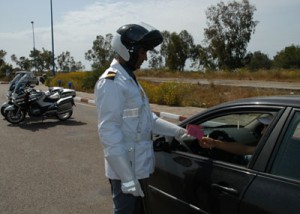
He works in collaboration with the judicial, administrative and military authorities as well as with representatives of all departments of the regional district which may encompass several provinces.
In addition to his Staff, the Commander of a Region has:
• Brigade of Environment that has jurisdiction over all the regional district;
• Brigade of Security and intervention also based in the company town area. It fulfills specific missions within the framework of maintaining and restoring public order;
• Regional kennels with several dogs for tracking, detecting drugs and explosives, and for, attack and defense.
The Company
It is an echelon which reports directly to the Region Commander, it oversees a number of brigades, and is commanded by an officer. In terms of administrative division, the district of a company corresponds to that of a province.
In his daily activity, the company commander is a real practical man: he directs and coordinates the activities of brigades, controls the execution of the service and ensure continuous training of his staff. He takes over the management of important affairs.
To do this, the company commander has, in addition to a staff, a number of units such as:
• Judicial Brigade: it supports important business that exceed the capacity of other brigades, through its specialized staff and technical facilities.
• Motorcycle Platoon: it is specifically responsible for regulating traffic, preventing traffic accidents, ensuring the safety of road users and providing them with assistance when needed.
• Motorcycle Platoon Motorway: Ensures, in close liaison with the territorial units, the tasks of traffic police.
The territorial Brigade (police office):
Kingpin, it performs all the missions of the Gendarmerie Royale. It is commanded by a non-commissioned officer who commanded fifteen elements. There is an average of three to four brigades in a territorial company.
- The Gendarmerie Mobile:
The second subdivision of the Gendarmerie Royale is responsible primarily for maintaining and restoring public order. Located in major cities, it is composed of groups of squadrons, squadrons and platoons. The squadron is the basic unit in law enforcement.
Gendarmerie Mobile has some main missions and secondary missions.
In addition to the main missions including law enforcement and strengthening of the territorial , the gendarmerie mobile is a reserve force at the disposal of the command to provide, if necessary, an active participation in country’s internal defense.
It also provides complementary training to the staff and, if necessary, it provides staff to form the military Police.
- The Air and Naval Gendarmerie:
They are grouped into the air and naval Companies and Brigades. They exercise all the attributions assigned to them by the laws and regulations. Their work covers the installations and establishments of the Air Force and Royal Navy. The Air Force exercises its powers in airports and airport dependencies through PGTA.
The Naval Force uses powers in ports and along the coast through Naval Brigades.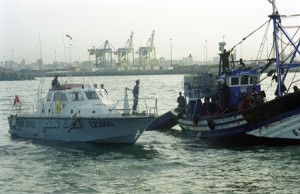
In addition to its traditional missions and through its special means, the Naval Squadron is competent to participate in monitoring fisheries and maritime navigation and to fight:
• Marine pollution;
• Illegal migration;
• Traffic of any kind.
- Specialized units
This is a set of units which have specific characteristics, whether in the context of the missions assigned to them or the means at their disposal.
–Squadrons of the Group of Honor:
Based in Rabat, the unit’s core missions are to represent arms and to provide the escort and security of His Majesty the King.
-The Air Group:
It is an element of command, equipped with aircrafts which operates, whenever the need arises, to strengthen the action of the units of the Royal Gendarmerie in the areas of administrative police (monitoring, help, assistance, protection of the environment, etc..) judicial police (recognition, search for criminals, transportation of investigators, etc..), in addition to escort and other missions requiring the use of aircraft.
–Security Group and Intervention:
This group includes various entities and highly specialized personnel in charge of fight against organized crime, piracy and violent crime in general.
The group includes some equestrian and paratroops units.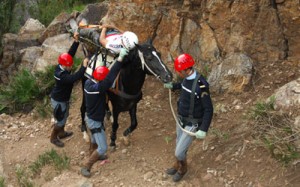
-Training schools:
Consisting exclusively of officers and noncommissioned officers, the Royal Gendarmerie gives special attention to training its staff.
The Royal School of Gendarmerie Officers (EROG) is dedicated for the training of officers. Three courses are held (the senior officers course, the captains course and the application course for young officers).
The training given in the E.R.O.G is in constant evolution. Like the major military academies, programs are regularly updated and adapted to the training needs required by the current situation. The goal is to shape a profile of gendarme officer fit for the challenges of the 21st century.
As regards non-commissioned officers, the initial patent in Higher Force (BSG), to the degree of Judicial Police Officer (OPJ), career success depends on a series of courses that Constable, the MDL-chief or the adjutant to perform.
– Schools and training centers of the royal gendarmerie:
- Royal School of Gendarmerie Officers
- Royal School of Gendarmerie in Marrakech
- School of Diving Temara
- The Group of Air Training
- Training Centre SPAM
- Motorcyclists Training Centre
Human Resources: versatility and professionalism
The wide range of missions and the relatively low numbers require some flexibility from the personnel of the Gendarmerie Royale. Thus, a Gendarme from a territorial brigade, without specific qualification should be able to act properly as:
• Law enforcement officer;
• An administrative police officer;
• Judicial police officer;
• Agent of the military judicial police.
Hence the importance of selection, basic training and in-service training, and once in the units a special care is given to the personnel.
Social: to preserve the welfare of the personnel:
Created almost at the same time as the Gendarmerie Royale, the Social Service had for a very limited role. Its action was limited to those who had the right to benefit from it.
Faced with a growing demand for social services, mainly due to the increasing number of the personnel, the service was reorganized in the early 80s. This evolution took place, largely thanks to the contribution of the Fraternity of the Royal Gendarmerie by conducting a variety of social projects aimed at improving the quality of life of the Gendarmes and their families.
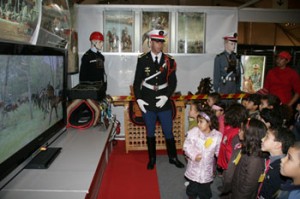 Moral support
Moral support- Assistance to families…
- Medical assistance …
- Schooling infrastructure…
- Social extra-social activities…
- International cooperation
The Moroccan Royal Gendarmerie works with various police and gendarmeries of the region, particularly with samilar institutions on the other side of the Mediterranean. This cooperation, only bilateral in the past, has expanded and developed, since the integration, in 1998, of the Royal Gendarmerie into the association of Euro-Mediterranean police forces with military status.
In the context of cooperation with other police forces, the schools of the Royal Gendarmerie receive every year students from friendly countries who follow training courses during a year.
Besides, officers and Non-commissioned officers of the Royal Gendarmerie perform training sessions abroad.
The Royal Gendarmerie, that is a police force with military status, has set itself up despite its young age, among the modern public forces with which it maintains a mutually beneficial relationship. Its action extends over the entire territory of the Kingdom as well as the armies. However, it is particularly intended for the rural areas and roads.
Very close to the ground and people who represent its best support, the Royal Gendarmerie has the jurisdiction necessary to take up the challenges of the 21st century. The diversity and the increasing number of its tasks have led the Royal Gendarmerie to develop the adaptability skills of its personnel.
Personnel and weapons, the Royal Gendarmerie invests mainly in its personnel whose professionalism and loyalty are essential to fulfilling the core mission, namely the protection of citizens, their property and the institutions.


